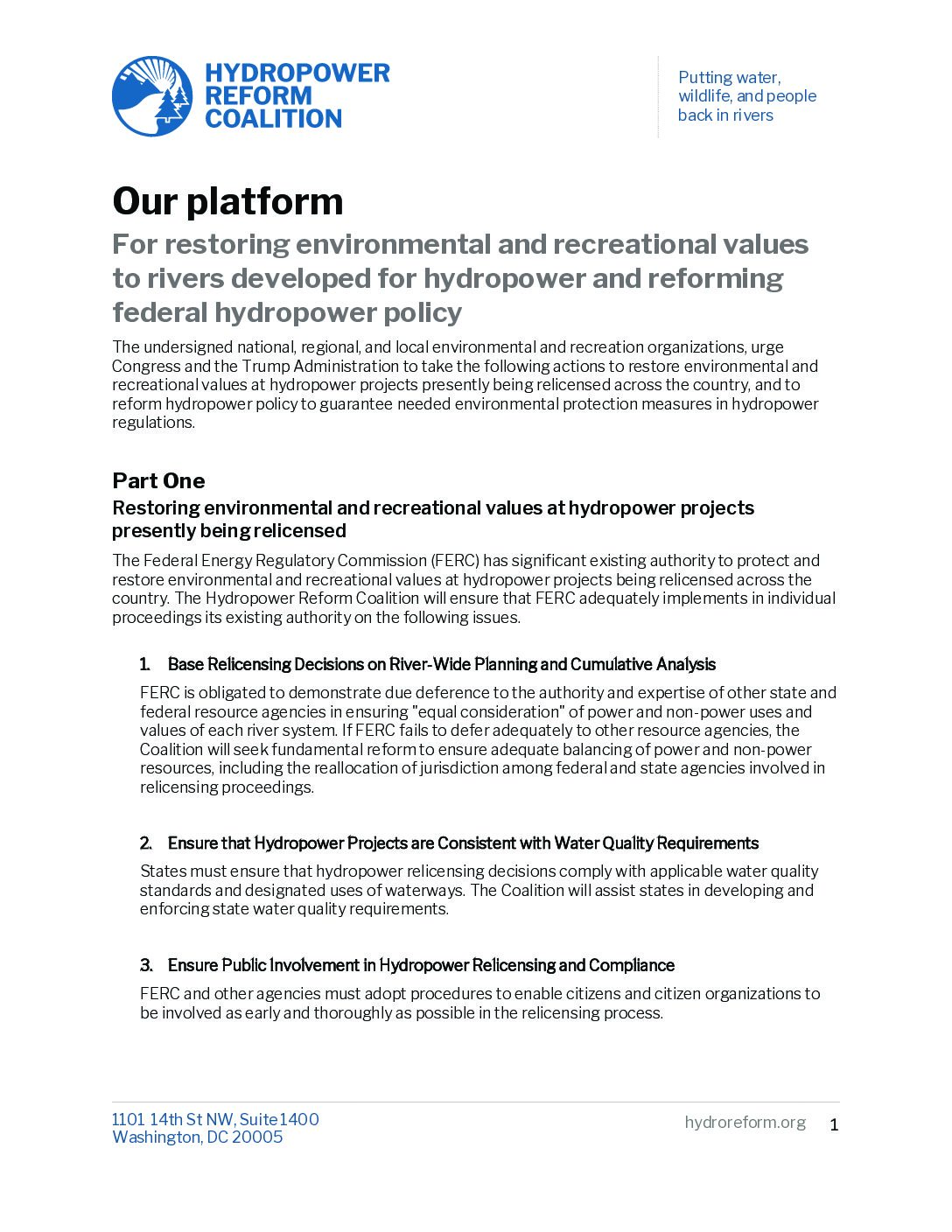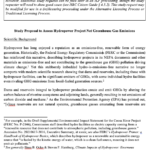The Coalition platform lays out the guiding principles on which all members can agree.
The platform is broken into two parts: Part One, “Restoring Environmental and Recreational Values at Hydropower Projects Presently Being Relicensed,” addresses the environmental and recreational principles toward which each FERC licensing process should strive. Part Two, “Reforming Hydropower Regulations to Guarantee Sufficient Environmental Protection Measures,” discusses the corollary regulatory principles.
Our platform
For restoring environmental and recreational values to rivers developed for hydropower and reforming federal hydropower policy
The undersigned national, regional, and local environmental and recreation organizations, urge Congress and the White House to take the following actions to restore environmental and recreational values at hydropower projects presently being relicensed across the country, and to reform hydropower policy to guarantee needed environmental protection measures in hydropower regulations.
Part One
Restoring environmental and recreational values at hydropower projects presently being relicensed
The Federal Energy Regulatory Commission (FERC) has significant existing authority to protect and restore environmental and recreational values at hydropower projects being relicensed across the country. The Hydropower Reform Coalition will ensure that FERC adequately implements in individual proceedings its existing authority on the following issues.
- Base Relicensing Decisions on River-Wide Planning and Cumulative Analysis
FERC is obligated to demonstrate due deference to the authority and expertise of other state and federal resource agencies in ensuring “equal consideration” of power and non-power uses and values of each river system. If FERC fails to defer adequately to other resource agencies, the Coalition will seek fundamental reform to ensure adequate balancing of power and non-power resources, including the reallocation of jurisdiction among federal and state agencies involved in relicensing proceedings.
- Ensure that Hydropower Projects are Consistent with Water Quality Requirements
States must ensure that hydropower relicensing decisions comply with applicable water quality standards and designated uses of waterways. The Coalition will assist states in developing and enforcing state water quality requirements.
- Ensure Public Involvement in Hydropower Relicensing and Compliance
FERC and other agencies must adopt procedures to enable citizens and citizen organizations to be involved as early and thoroughly as possible in the relicensing process.
- Restore Sufficient Water Flows and Habitat to Rivers
FERC must ensure that ecological and recreational values of rivers long degraded by hydropower are restored with sufficient water flows. Instream flows must provide adequate protection for endangered or threatened species and for wildlife and fisheries habitat, and sufficient opportunities for recreational activities. To help achieve these goals, water must be restored to dried-up river stretches, flow levels raised in excessively low-flow stretches, and highly fluctuating flows moderated where they harm the ecosystem or pose a safety problem.
- Establish a Mitigation Fund for River Conservation and Restoration Programs
Licensees must be required to establish environmental mitigation funds by setting aside a percentage of their gross power revenues for river conservation, restoration, and recreation projects.
- Mandate Needed Facilities for Upstream and Downstream Fish Passage
Hydropower projects must no longer be allowed to impede the migration of, kill, or injure fish. FERC must assist in the restoration of fish populations by requiring, where appropriate, the most biologically effective fish passage along with sufficient flows for spawning, rearing and migration. FERC must also require compliance with state and federal fisheries management and restoration programs.
- Protect Riparian and Watershed Lands
Rivers are directly impacted by the integrity of surrounding watershed land. FERC must require that all lands owned by a licensee in the vicinity of its hydropower project be included within the project boundary. FERC must also require each licensee to manage lands it owns to mitigate project impacts. Absent ownership, licensees must be required to purchase such lands from willing sellers.
- Ensure Free Public Access to Rivers
Project licensees must provide reasonable and safe access to the river in the vicinity of hydroelectric projects for recreational activities. Licensees should not be allowed to charge the public for access to public rivers.
- Guarantee Sufficient Funding for Dam Decommissioning
FERC must either require establishment of a general fund to cover decommissioning of retired hydroelectric projects, or, as a requirement of issuing individual licenses, ensure that all licensees have financial resources to pay the cost of individual project decommissioning.
- Ensure Flexibility in the Relicensing Process
To ensure that the non-power values of rivers are adequately protected, FERC must exercise its existing authority in a coordinated and flexible fashion that will identify the best system of protection based on the circumstances of each individual proceeding.
Part Two
Reforming hydropower regulations to guarantee sufficient environmental protection measures
Although FERC currently has authority to protect the environmental and recreational values of rivers developed for non-federal hydropower, reform of FERC’s substantive and procedural authority is needed to guarantee sufficient protection of the non-power resources of these rivers. The Hydropower Reform Coalition seeks to effect the following reforms as appropriate through administrative initiatives, legislative improvements, and negotiation with industry.
- Ensure Uniformity and Certainty of Federal Action
FERC is obligated to demonstrate due deference to the authority and expertise of other state and federal resource agencies in ensuring “equal consideration” of power and non-power uses and values of each river system. If FERC fails to defer adequately to other resource agencies, the Coalition will seek fundamental reform to ensure adequate balancing of power and non-power resources, including the reallocation of jurisdiction among federal and state agencies involved in relicensing proceedings.
- Ensure that Hydropower Projects are Consistent with Water Quality Requirements
States must ensure that hydropower relicensing decisions comply with applicable water quality standards and designated uses of waterways. The Coalition will assist states in developing and enforcing state water quality requirements.
- Ensure Public Involvement in Hydropower Relicensing and Compliance
FERC and other agencies must adopt procedures to enable citizens and citizen organizations to be involved as early and thoroughly as possible in the relicensing process.
- Improve the Scientific, Economic and Efficiency Analyses of Proposed Relicensing Projects
FERC must improve the scientific, economic and efficiency analyses of proposed relicensing projects. In particular, the analyses must be conducted in a more consistent fashion and by independent, qualified third parties; the results must be subject to independent peer review and properly applied to the project.
- Improve FERC Procedures for Relicensing Hydropower Facilities
Present FERC regulations for relicensing hydropower facilities are inefficient, do not ensure adequate balancing of power and non-power resources, and do not enable sufficient public participation early in the licensing process. The Coalition will continue to work with FERC, other agencies, and the hydropower industry to develop procedures that are clear, efficient, and adequately protect natural resource concerns.
- Ensure FERC’s Adherence to Environmental Laws
FERC is obligated by the Electric Consumers Protection Act (ECPA) to give “equal consideration” to power generation and the recreational and ecological values of free-flowing streams in making its decisions. In addition, FERC must comply with the National Environmental Policy Act (NEPA), which necessitates the preparation of environmental impact statements where appropriate, the Clean Water Act (CWA), and other state and federal laws. The Coalition will exercise careful oversight of FERC to ensure that it adheres to these and other environmental laws.
- Appoint FERC Commissioners Who Have Experience in Natural Resource Protection
A significant component of FERC’s role in regulating energy development is protection of natural resources and minimization of the environmental impacts of energy development. To provide appropriate expertise for this role, the Administration must nominate Commissioners to FERC who have backgrounds in natural resource protection.
- Encourage Settlements
FERC should encourage settlement of relicensing proceedings by the parties.


 HRC or member-contributed
HRC or member-contributed